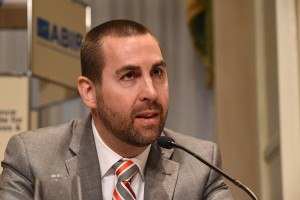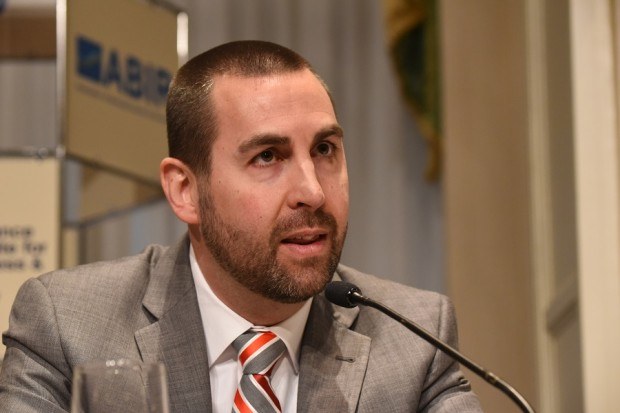The designation of MetLife as a systemically important financial institution by the Financial Stability Oversight Council is a done deal. But exactly what that means in terms of higher regulatory standards is still not clear.
Those details could come this year, Adam Hamm, a nonvoting member of FSOC representing state insurance regulation said Tuesday at an insurance industry conference. He spoke less than an hour before news broke about MetLife’s plan to preempt any potential issues by pursuing a separation of its retail insurance operations.
“There hasn’t been an answer from the Federal Reserve Board on exactly how those SIFIs are going to be regulated. I wouldn’t be a bit surprised if those final rules, or at least initial building blocks that resolve [how] Prudential and MetLife are going to be regulated at the holding company level, come out from the Federal Reserve Board in 2016,” he predicted.

Hamm spoke during a panel titled, “A View From the Outside Looking In,” at the Property/Casualty Insurance Joint Industry Forum in New York on Jan. 12. Moderator Charles Chamness, president and chief executive officer of the National Association of Mutual Insurance Companies, asked Hamm and other experts to prognosticate about changes in the political and regulatory environment in the presidential election year. He also specifically asked Hamm, who is a non-voting member of FSOC, to give an insider’s view of the work of the Council.
After predicting a level of turnover in state insurance commissioners that is consistent with 2015, Hamm told attendees to keep an eye on data breach legislation in Congress. Hamm who has decided not to run for reelection in 2016 and who currently chairs the National Association of Insurance Commissioner’s task force on cybersecurity said, “There’s some motivation and some consensus developing around that” cybersecurity bill, although he ultimately predicted that the typical gridlock of a presidential year would keep it from being finalized in 2016.
Addressing Chamness’s question about FSOC, Hamm described the struggles that he and Roy Woodall, the former Kentucky insurance regulator, face in trying to help the rest of the members understand state insurance regulation. “They are serious but intelligent people,” mostly with banking backgrounds, he said, rattling off names like Jack Lew, Secretary of the Treasury and FSOC Chair, Janet Yellen, Chair of the Board of Governors of the Federal Reserve System, Martin Gruenberg, Chair of the Federal Deposit Insurance Corporation and Mary Jo White, Chair of Securities and Exchange Commission, who are among the 12 federal government representatives and 10 voting members of the Council.
Woodall, who participates as “an independent member with insurance expertise,” is also voting member, while Hamm and two other state regulators—one from banking and one for securities—are nonvoting members. Michael McRaith, Director of the Federal Insurance Office, is also a nonvoting member.
Noting his respect for the rest of the group, Hamm said it’s not easy to defend insurance in that room.
“It is an uphill battle to make positive movement with my colleagues…not just to understand the difference between banking and insurance but to actually make decisions that incorporate that.” At the end of the day, we have seen in the designations of Prudential and MetLife [as SIFIs], which I strongly disagree with,” he said, inviting Forum attendees to read the dissenting opinion he wrote on MetLife late last year.
“It is disturbing that the Council continues to diminish the role of the state insurance regulatory framework,” he wrote in that opinion. “It is unclear…what additional tools beyond those already at an insurance regulator’s disposal could effective address the risks the Council identifies, which are, in large part, concerns emanating from insurance legal entities that state insurance regulatory authorities are specifically designed to address.”
At the Forum, Hamm said, “I believe that FSOC got those two wrong,” referring to MetLife and Prudential, for which he noted that his FSOC predecessor, Missouri Insurance Director and NAIC President John M. Huff, had penned the dissent.
Hamm’s comment at the Forum came just about 45 minutes before MetLife publicly announced a plan to pursue the separation of a substantial portion of its U.S. Retail segment—through a public offering of shares in an independent, publicly traded company, a spinoff, or a sale.
“Currently, U.S. Retail is part of a Systemically Important Financial Institution (SIFI) and risks higher capital requirements that could put it at a significant competitive disadvantage,” said Steven A. Kandarian, MetLife chairman, president and CEO, in a press statement. “Even though we are appealing our SIFI designation in court and do not believe any part of MetLife is systemic, this risk of increased capital requirements contributed to our decision to pursue the separation of the business. An independent company would benefit from greater focus, more flexibility in products and operations, and a reduced capital and compliance burden.”
Back at the Forum, attendees weighed in on their views of the participation of the federal government in the insurance industry. As part of an audience poll, attendees were asked, “Do you think the federal government is interested in further expanding its regulatory oversight of insurers?”
A whopping 87 percent said yes. That was the largest majority vote on any question in the survey that also touched up views about economic growth and industry financial results.
Speaking from the stage, Hamm’s co-panelist, Michael Pritula, director and senior leader of the Global Insurance Practice of McKinsey & Company, offered the view of the majority. “The Fed and FIO will grow in importance for the industry. Their toe in the water is going to become a foot,” he told said, responding to Chamness’s call for predictions.
On a different question about the federal government—the outcome of the presidential election—the 80 attendees who responded the Forum survey picked a Democrat over a Republican by a slimmer margin—55 percent to 45 percent.





















 Earnings Wrap-Up: AXIS Expanding Insurance Biz, Shrinking Re Book
Earnings Wrap-Up: AXIS Expanding Insurance Biz, Shrinking Re Book  Insurance Groundhogs Warming Up to Market Changes
Insurance Groundhogs Warming Up to Market Changes  Modern Underwriting Technology: Decisive Steps to Successful Implementation
Modern Underwriting Technology: Decisive Steps to Successful Implementation  20,000 AI Users at Travelers Prep for Innovation 2.0; Claims Call Centers Cut
20,000 AI Users at Travelers Prep for Innovation 2.0; Claims Call Centers Cut 
















